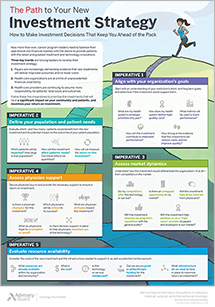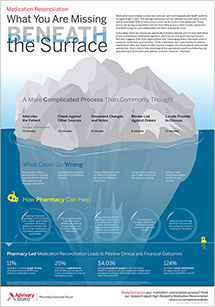Auto logout in seconds.
Continue LogoutEditor's note: This popular story from the Daily Briefing's archives was republished on Sept. 7, 2018.
By Scott Orwig, Senior Manager
The 340B Drug Pricing Program is one of the most contentious issues in health care: Its critics say it "hurts patients" and is being "abused" by hospitals. Its defenders say it's "vital" to the health of low-income patients and essential to helping safety net hospitals care for their communities.
Exclusive tool: The Oncology Medicare Market Explorer
And now, CMS has said it will cut Medicare Part B drug payments to providers enrolled in 340B by 28%-- prompting a lawsuit from a half-dozen health care organizations alleging that the cuts pose a "serious threat … for millions of Americans" and would "dramatically threaten access to health care for many patients."
Unfamiliar with 340B, or need a refresher? Keep reading to understand the 340B program, how it works, who it serves, why it's controversial, and what reimbursement cuts could mean for providers.
To learn more about Medicare Part B reimbursements and other provisions in the 2019 Hospital Outpatient Prospective Payment System (OPPS) proposed rule, watch the on-demand presentation and download our cheat sheet for a refresher on HOPPS.
What is the 340B program?
Since 1992, HHS’ 340B program has enabled hospitals and clinics that serve high volumes of low-income patients to purchased discounted outpatient drugs. Eligibility has expanded greatly over time, from about 90 hospitals when the program began to more than 2,000 hospitals today.
Provider organizations that participate in the 340B program can purchase covered outpatient drugs from manufacturers at a sizeable discount—typically 20% to 50%. Patients make their usual copayment, and the insurer is billed for the full, non-discounted drug price.
HRSA estimates that through 2013, the program saved provider organizations $3.8 billion. These savings are meant to offset the costs of uncompensated care and unprofitable services, but critics of the program claim that some providers have abused 340B as a stream of new revenue.
Who is eligible for 340B?
Providers who participate in the 340B program are known as "covered entities" (CEs). Initially, they were comprised only of federally qualified health centers, disproportionate share hospitals, and federal grantees under specified programs.
In 2010, the ACA greatly expanded the eligibility criteria to include children's hospitals, critical access hospitals, freestanding cancer hospitals, rural referral centers, and sole community hospitals—adding an estimated 1,500 new providers to the program. In all, about 40% of U.S. hospitals participate.
While organizations that participate in the 340B program are required to serve a disproportionately high percentage of low-income patients, drugs purchased under the 340B program can be dispensed to any patient with any income who:
- Has an established relationship with the provider, in that the provider maintains records of the individual's care;
- Receives care from a professional affiliated with the covered entity such that they retain responsibility for the patient's care; and
- Receives health services from the covered entity that are consistent with the services for which grant funding has been provided to the entity.
What types of drugs can be purchased through 340B?
Certain "separately payable" drugs paid for through Medicare Parts B and D are eligible for discounts under 340B. They include:
- FDA-approved prescription drugs and insulin;
- Over-the-counter drugs written on a prescription; and
- Biological products that can be dispensed only by a prescription (other than vaccines).
What's the new controversy surrounding the 340B program?
In November, CMS finalized a rule to cut Medicare Part B reimbursement for drugs purchased at 340B discounts by 28%.
Medicare Part B currently reimburses providers for drugs purchased through the 340B program at a rate of the drug's average sale price (ASP) plus 6%—but the 2018 OPPS final rule is poised to change that. On Nov. 1, CMS announced that it will instead reimburse ASP minus 22.5%. CMS based the new reimbursement rate on a 2015 MedPAC analysis, which estimated that the average discount on 340B drugs was 22.5%.
For example, if a hospital purchased a drug with an ASP of $1,000 at a discounted price of $600:
- Under the current system, Medicare reimburses them $1,060;
- Under the new rule, which takes effect Jan. 1, they'd receive just $775.
That represents a $1.6 billion reduction in 2018 alone, which some advocacy groups claim could jeopardize the future of some providers, especially those serving small, rural populations.
Within days of the release of the new rule, a group of hospitals and health organizations—including the American Hospital Association (AHA), the Association of American Medical Colleges, America's Essential Hospitals (AEH)—filed suit to stop the cuts.
In a statement issued at the time, AHA President and CEO Rick Pollack said, "CMS' decision to cut Medicare payments for so many hospitals for drugs covered under the 340B program will dramatically threaten access to health care for many patients, including uninsured and other vulnerable populations." And AEH President and CEO Bruce Siegel added, "This lawsuit underscores the serious threat CMS' policy poses for millions of Americans who depend on affordable drugs and health care services made possible by 340B savings."
It's worth noting that the payment rate decrease doesn't apply to critical access and children's hospitals, rural sole community hospitals, PPS-exempt cancer hospitals, or non-excepted outpatient providers billing under the Medicare Physician Fee Schedule.
What do 340B cuts—and controversy—mean for patients and providers?
CMS says this reimbursement cut will lower out-of-pocket drug costs for Medicare patients. The agency estimates that patients will save $320 million in 2018 on coinsurance alone, since Medicare will be paying less for the drugs. However, because the cut targets only reimbursement, it would not affect how drug manufacturers set prices, nor would it change prices paid by wholesalers or providers.
On a more technical level, the rule also introduces new coding requirements for 340B hospitals starting in 2018. Covered entities that are subject to the reimbursement cut must add the modifier "JG" to claims when the drugs were purchased at the 340B rate. Covered entities that are exempt from the new cuts must add the modifier "TB” when the drugs were purchased at 340B rates. Presumably, CMS hopes to use the data to better determine how 340B influences Part B prescribing and thus Medicare spending.
The lawsuit to block the proposed cuts remains pending, and lawmakers are considering legislation to block the cuts.
What cancer programs should know about the 2019 HOPPS proposed rule
To learn more about Medicare Part B reimbursements and other provisions in the 2019 Hospital Outpatient Prospective Payment System (OPPS) proposed rule, watch the on-demand presentation and download our cheat sheet for a refresher on HOPPS.
- Watch the HOPPS on-demand presentation
- Download the HOPPS slide deck
- Access the HOPPS cheat sheet
Don't miss out on the latest Advisory Board insights
Create your free account to access 1 resource, including the latest research and webinars.
Want access without creating an account?
You have 1 free members-only resource remaining this month.
1 free members-only resources remaining
1 free members-only resources remaining
You've reached your limit of free insights
Become a member to access all of Advisory Board's resources, events, and experts
Never miss out on the latest innovative health care content tailored to you.
Benefits include:
You've reached your limit of free insights
Become a member to access all of Advisory Board's resources, events, and experts
Never miss out on the latest innovative health care content tailored to you.
Benefits include:
This content is available through your Curated Research partnership with Advisory Board. Click on ‘view this resource’ to read the full piece
Email ask@advisory.com to learn more
Click on ‘Become a Member’ to learn about the benefits of a Full-Access partnership with Advisory Board
Never miss out on the latest innovative health care content tailored to you.
Benefits Include:
This is for members only. Learn more.
Click on ‘Become a Member’ to learn about the benefits of a Full-Access partnership with Advisory Board
Never miss out on the latest innovative health care content tailored to you.


